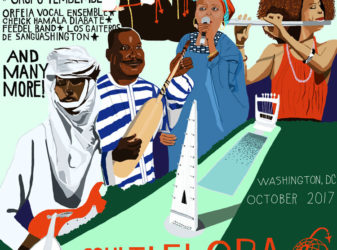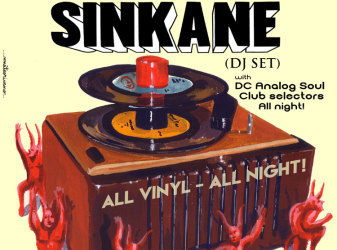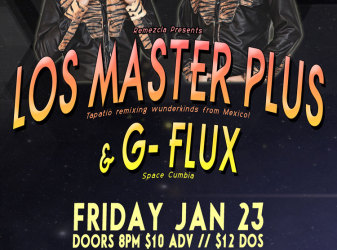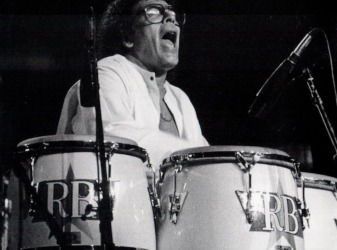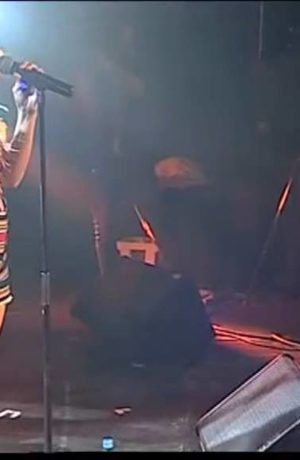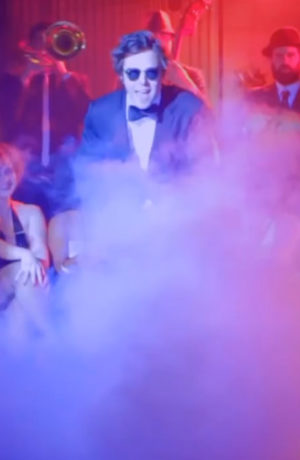Read Our Interview With M.A.K.U. Soundsystem in PERISCOPE
We caught up with M.A.K.U.Soundsystem, an immigrant band from New York City for an interview for the iPad publication PERISCOPE. With most of its members hailing from Colombia, M.A.K.U embodies an active quest for identity through sound and bodies in motion, and puts on a party for everyday people. Born in 2010 the band has independently released two full-length albums, one EP, and toured across the U.S. with their fiery grooves. M.A.K.U’s distinctive sound is enriched with a variety of musical backgrounds brought to the table by each of its members. Although not inherently discernible there are hints of Colombian Folklore, Psychedelic-rock and Caribbean grooves. It all comes together through a D.I.Y. attitude of getting things done, from composing to releasing independent records; M.A.K.U is as much about the music as it is about a way of life.
Read our interview here:
Like the incessant beat of the llamador drum, the key instrument in all cumbia music, the region of our planet that we call Colombia seems to just keep giving, dare I say, cranking out, some of the most vibrant, life-affirming, and danceable music in Earth’s atmosphere today. The last few years especially have seen a tidal wave of re-issues from labels like Soundway who’ve dug deep into the vaults and brought to light some of Colombia’s finest jewels from across the rich musical spectrum, re-issuing them with a curatorial quality normally reserved for ethnomusicologists and museums. Diplo mines the backbeats of cumbia, and tropical bass parties are popping up and banging all over the world filtered through the nob twists of the likes of club DJ’s Geko Jones and Uproot Andy where you’re likely to hear traditional musical styles and instruments like cumbia, gaita, and champeta mixed and mashed over a bumping 808 bass drum. And the UK-born musician, DJ, and record producer Will Holland a.k.a. Quantic is having such a love affair with Colombia that he now bases himself out of Cali where he’s busy curating, recording, releasing, and re-issuing music at a fevered pitch while collaborating with Colombian greats like Fruko, Anibal Velasquez, Michi Sarmiento, Alfredito Linares and Wilson Viveros (to name just a few) and younger musicians, like the band Frente Cumbiero who themselves have been re-interpreted by the legendary reggae dub master The Mad Professor.
Colombia’s music is a long and winding river which traverses over many landscapes with cultures and subcultures all existing within one vast, intricate, and interconnected musical ecosystem. I found myself up a tributary last week as I sat down in the Brooklyn neighborhood of Crown Heights with four of the eight members of the New York-based by-way-of-Colombia band M.A.K.U. Soundsystem to discuss their music, which invariably led us down many fascinating rabbit holes. M.A.K.U. Soundsystem came together as a group comprised of Colombian expats living in New York sometime between 2009 and 2010. In a short time they have independently released two records Vamos Bien (2010) and MAKUMBALA (2011) and they show no signs of slowing down with a new recording in the works for the summer of 2012. Their live show is something of an experience, laced with dense, driving danceable rhythms and valleys of swirling psychedelic dub. All the usual suspects for a funk and rock band are present: electric guitar, bass, drum set, percussion, synthesisers, and a horn section. But there’s a consistent presence of another ingredient that keeps coming up on your ear’s tongue. That elusive je ne sais quoi that is at once familiar then suddenly slips out of your grasp and transforms into another form. Admittedly, upon meeting M.A.K.U. Soundsystem backstage at Brooklyn Bowl in late 2011 and gathering that they were mostly comprised of Colombian musicians, I expected to hear some underpinnings and borrowings from Colombia’s musical heritage, and I did, but what I also heard coming off the stage that night was much larger than anything I could categorize. And that’s just the way they want it.
The name M.A.K.U. refers to the Nukak-Makú peoples, a group of nomads from the Amazon region of southern Colombia, who mysteriously appeared out of the the wilderness and declared that they were ready to join the modern word. Having no concept of this modernity, they were suddenly embracing-property, money, government-and no official existence recognized by Colombia’s bureaucracy, they were essentially considered paradoxically nonentity entities. This paradox made an impression on guitarist Camilo Rodriguez who made a note of the predicament and applied the name some years later to the musical entity that he found himself in with other Colombian immigrants who made their way to New York. “The word Maku refers to people of the lower level of society. The worldwide theme of which is that immigrants are seen in a certain way and often looked down on as a burden or not worthy of being truly integrated into the dominant culture.” The soundsystem in the band’s name is a reference to the “picó”-a sound system made popular near the Caribbean coastal city of Barranquilla. Massive speakers are hooked up to turntables and become a romping party, sometimes going mobile on a pick-up truck that booms a melting pot of rhythms and grooves like dancehall, cumbia, champeta, soukous, calypso, and even Afrobeat. Basically it’s one big party.
So we could say M.A.K.U. + Soundsystem = party for the people. As these picós are affiliated with neighborhoods. there’s a built-in sense of community and they serve as a meeting place where everyday people gather to dance and have a chance to feel good about themselves.
For Juan Ospina,who plays bass and sings in M.A.K.U. Soundsystem, the group plays danceable music that has its foundation in Colombian folklore and is topped with the basic ingredients of modern punk/funk/rock, a foundation that according to the band, “allows us to express our experiences…how we see things-a positive message amidst the hardships of life. Music is a means of how to feel free, how to share this feeling–even if it’s for an hour of listening or sharing a space from the stage. We are constantly reminded of boundaries–such as immigration issues–and music helps us see and feel the possibility of freedom from mental and spiritual boundaries.”
Within the collective vision of the band is an undeniable influence of the folkloric music from Colombia. As the members are shaped by their experiences in New York, percussionist and singer Liliana Conde also recognizes “a discovery process” in effect with M.A.K.U. Soundsystem. Playing music with a band that allows for experimentation yields pleasantly surprising results sometimes when some traditional rhythm she remembers learning as a child in Colombia comes bubbling up to the surface, and then she, in turn, applies it to what a given song may have been calling for.
One important element to consider with all the emphasis on the folkloric and traditional elements in M.A.K.U. Soundsystem’s music is that innovation within the roots is an integral part of the tradition. 70s funk, rock, and Afrobeat found an enthusiastic audience in Colombia and elements of these imports were often combined and fused internally. There’s a famous Colombian version of Afrobeat’s inventor Fela Kuti’s song “Black Man’s Cry” called “Shacalao” by Moderna De Soldedad that gestures heavily to the African influence at the base of the cumbia rhythm. Before forming M.A.K.U. Soundsystem, guitarist Camilo Rodriguez was playing traditional Colombian music, but then he embraced this influence from the 70s. With a firm foot planted in tradition he’s “freed up” a bit more within M.A.K.U. For the drummer Andres Jimenez it was more a deliberate decision that he wanted his Colombian roots to be present in his New York life. Perhaps this healing force within the music found its way to him so it could give him the “feeling of two homes…where boundaries are not real.” That is to say, the members of M.A.K.U. did not move away from Colombia but rather they expanded into New York and more or less found each other there. Expats as kindred spirits with a common vision.
Now, more than ever, M.A.K.U. Soundsystem is poised to take their music to the next level. Andres points out that the more you study the great drumming traditions the more you realize that the great traditional drummers go out there beyond patterns. The group, now thoroughly marinated in all these colors and influences from their respective backgrounds, and NOT having the responsibility to represent Colombian music traditions, are now free to make up something and it’s becoming their own language. But their respect and reverence for what came before keeps them humble as they remain open to learn. A fitting metaphor for what the group is all about can perhaps be found in the instrument at the heart of cumbia-the llamador drum. Translated, it literally means “the caller.” If you’ve heard cumbia from anywhere in the world you’ll always hear it at the center of the music. It keeps the upbeat from beginning to end. No jamming. No time to show off. The player just keeps the beat locked down. As Juan Ospino adds “To be able to play the llamador humbles you.”
Band members present during this interview:
Camilo Rodriguez
Andres Jimenez
Liliana Conde
Juan Ospina
And band members not present include:
Robert Stringer (trombone)
Carlos Felipe Quiroz (Synth)
